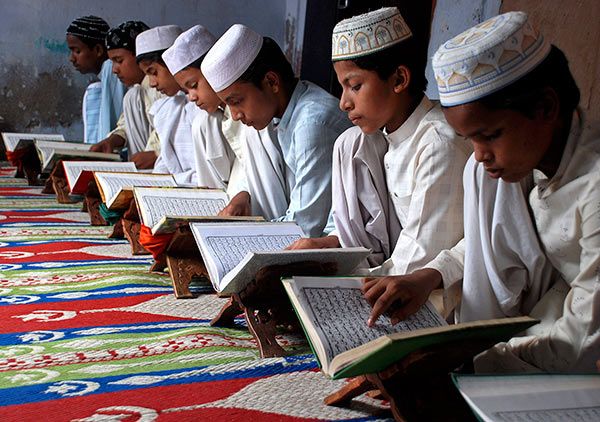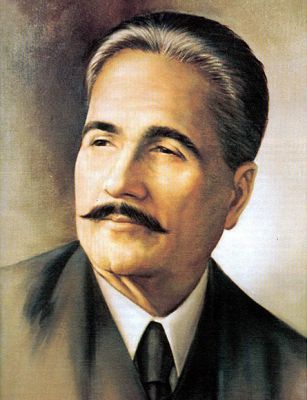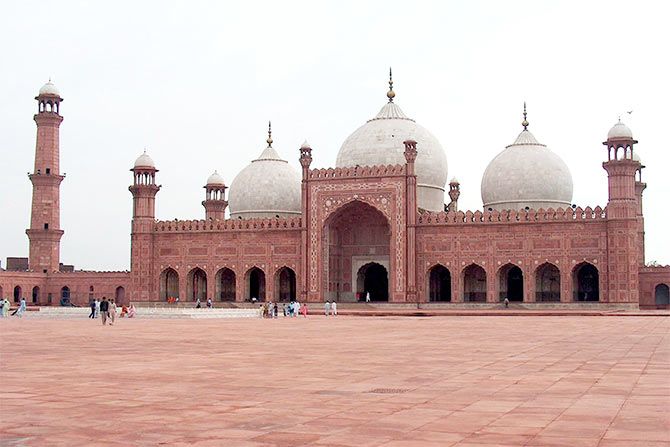'Muslims, like people of all other faiths, are quite comfortable with the idea of nationalism and democracy today. But are they following Islam in its spirit? That is a different question.'

Photograph: K K Arora/Reuters
"Iqbal feared that since democracy was about numbers, the Hindu majority would dominate Indian politics, culture and society and Muslims would be slowly marginalised and obliterated from India," says Zafar Anjum, author of Iqbal: The Life of a Poet, Philosopher and Politician.
In the first part of this fascinating interview, he explains to Syed Firdaus Ashraf/Rediff.com why he felt he had to write this book.
"I was compelled by our present state of affairs to shine a light on the dangers that we face today, through the life of one of India's great souls -- the forgotten poet, philosopher and politician, Iqbal."
"Iqbal thought of India as a bouquet with different flowers in it, each having it own colour. He feared that the Hindu nationalists would make the bouquet consisting of flowers of only one colour," says Anjum.
While researching the book, did you understand why Iqbal was opposed to the very concept of nationalism?
You have to look at nationalism in the context of his time.
Nationalism was easily converted to jingoism in those days -- a concept invented by the ruling elite to divide people to expand their empires. It became a proxy for imperialism. It led to wars and human deaths.
For the same reason, Tagore too had criticised nationalism. All pacifists critiqued nationalism those days; it was the ethos of that time. Einstein said nationalism is an infantile disease and it is the measles of mankind.
Also, from Islam's point of view, the entire earth belongs to the creator and has been bequeathed to mankind. Who gave man the right to divide and subdivide it?
The world belongs to everyone, every human being. Period. In this light, Iqbal questioned nationalism. He said:
In taaza khudaon me bada sabse watan hai
Jo pairahan iska hai, woh mazhab ka kafan hai
(Of all the new gods, the biggest is the god of nationalism,
Its garment is indeed the death-shroud of religion.)
 In your book, you (Left: Zafar Anjum) have mentioned that Israel and Pakistan were the only two countries founded on the basis of religion. Why do you think Israel made such tremendous progress in the standard of living for its citizens, while Pakistan is among one of the worst places to live in the world?
In your book, you (Left: Zafar Anjum) have mentioned that Israel and Pakistan were the only two countries founded on the basis of religion. Why do you think Israel made such tremendous progress in the standard of living for its citizens, while Pakistan is among one of the worst places to live in the world?
Israel has become what Iqbal's Pakistan should have been -- a State that is strong, powerful and at the cutting edge of innovation.
I am not condoning Israel's State violence against defenceless Palestinians, but there are many qualities that Muslim nations can learn from Israel.
What did Israel do right that Pakistan did wrong?
The country received huge world sympathy after the Holocaust. America supported it wholeheartedly, providing money and security. That support is still ongoing.
Pakistan had no such support. The country was created after the bloodbath of Partition (by the way, Iqbal never advocated the idea of transfer of population; it was Lala Lajpat Rai's idea). It had no resources and, right from the moment of its creation, it was at war with India, its blood brother, and neighbour.
Israel developed on the Western model: Democracy, a proper education system and an emphasis on science and technology. Pakistan, on the other hand, struggled with internal conflicts, war and militarisation at the cost of everything else.
In Israel, every young person goes through compulsory military training. Pakistan has no such system.
In my next book, Startup Cities, I have devoted a full chapter to Tel Aviv. There are many lessons to learn from Israel in terms of how to organise a society.
After the formation of Bangladesh, do you think the idea of Pakistan was flawed? After all, Islam could never unite Bengali Muslims with West Pakistan.
As long as Pakistan exists, we can't say it was a flawed idea.
Similarly, if India becomes a Hindu Rashtra, we can't say that India, conceived by our freedom fighters and makers of the nation as a secular State, was a flawed idea.
Nations grow, develop, evolve, get dissected and divided and sometimes even disappear from the world's map.
As far as the creation of Bangladesh is concerned, instead of blaming Islam for everything, we should see it in terms of human behaviour. Sometimes, even two brothers in a family can't live together.
Islam is an ideal and to sacrifice everything for Islam is not easy even at an individual level. It becomes near impossible to make it happen at a collective level.
Many factors, both internal and external, came into play and led to the creation of Bangladesh. This was bound to happen sooner or later.
Jinnah had complained of being handed a moth-eaten and truncated Pakistan right at the time of Pakistan's formation.
According to Iqbal, Islam was under siege from two directions -- the attack of the materialistic renunciation of faith and the onslaught of territorial nationalism. It is our responsibility to confront both dangers, he had said.
Do you think that, 100 years after Iqbal wrote those words, Islam and its followers have still not been able to adjust to the concept of nationalism?
Muslims, like people of all other faiths, are quite comfortable with the idea of nationalism and democracy today. But are they following Islam in its spirit? That's a different question.
Iqbal never said that Muslims should renounce the world. He admired the European man of action who creates his own future and shapes his own destiny. Iqbal exhorted Muslims to become men of action and take their share of the world, as the Quran has commanded.
 Iqbal (seen, right)was a secular poet who wrote about Lord Ram and the Gayatri Mantra. He wrote Saare Jahan Se Achcha. When did he start leaning towards the communal politics of the Muslim League and thinking of a separate homeland for Muslims?
Iqbal (seen, right)was a secular poet who wrote about Lord Ram and the Gayatri Mantra. He wrote Saare Jahan Se Achcha. When did he start leaning towards the communal politics of the Muslim League and thinking of a separate homeland for Muslims?
The turning point came between 1905 and 1908, when he studied at Cambridge, Heidelberg and Munich.
Europe gave him a glimpse of the dangers of nationalism and the perils of the new civilisation. He observed how nationalism spawned irreligiosity and alienation from religion. He did not want Muslims to go down the same route.
>He made it his life's mission to awaken his nation (Muslims in India) to achieve a glorious future for themselves. This could not happen as long as they were not free.
In this way, his European sojourn became the breaking point for him. He came into active politics much later, in 1926.
>He gave the call for a separate State for Muslims in North Western India because of Hindu communal politics and the riots that threatened the survival of Muslims in India.
How far did the Arya Samaj and the shuddhikaran (purification) movements affect Iqbal's view towards Hindu-Muslim relations?
During the 1920s, Iqbal witnessed the emergence of two Hindu movements that had profound implications for Muslims in India. These two movements were Shuddhi and Sangathan.
Iqbal saw these movements as unfortunate developments that maligned India. 'Our mutual conflicts are most regrettable,' he said at a public meeting in Lahore on January 22, 1927. 'We do not stop to think and evaluate the impact of these internal conflicts on other Asian nations...'
'In my perception, the truthful reality is like a sparkling diamond which radiates many dimensions, reflecting different colours. Everyone is entitled to select a radiance of colour of his own choice and see reality from his own perspective...'
'Islam gave the same message of truth, which the (Hindu) rishis taught in ancient times. I appeal to you, in the name of truth, to appreciate the realities. Don't fight with each other...'
'There are people in India who encourage mutual conflicts in order to serve their own interests. The peace of the country will be seriously disrupted by your in-fighting. Everyone will suffer.'
To counter the two Hindu movements, Muslims too launched two movements: Tablighi Jamaat and Tanzim.
Iqbal wrote to his friend Ghulam Bhik Nairang in support of such counter-movements on January 24, 1927: 'In my judgment, the missionary endeavours for Islam take priority over any other activity. If the Muslims' objective in India is to attain political freedom and economic well-being, and the defence of Islam has no place in it -- as it demonstrated in the policy of (nationalist) Muslims -- and Muslims will never succeed in achieving their goals.'
For Iqbal, these Hindu nationalist movements further underlined the fact that Muslims would have to deal with Hindu majoritianism. He saw India like a sparkling diamond and her different communities (Hindus, Muslims, Sikhs, Christians, etc) as its various facets that radiated their own unique colours.
Iqbal thought of India as a bouquet with different flowers in it, each having it own colour. He feared that the Hindu nationalists would make the bouquet consisting of flowers of only one colour.
That was the psychological impact of the Shudhi and Sangathan movements on Iqbal.
A beautiful couplet Iqbal uses for himself is 'Dhoondta phirta hoon aye Iqbal apne aapko, Aap hi goya musafir, aap hi manzil hun mein'. Is it true that he was in constant search for the meaning of life?
Iqbal was a dynamic and complex personality. His quest was the quest for love, harmony and truth. He has said many couplets that exhort self-enquiry and self-assessment. For example, he said:
Apne man me doob kar paa ja suragh-e zindagi
Tu agar mera nahin banta, na ban, apna to ban
(Find the secret of life in your own mind
If you cannot become mine, at least become your own)
Iqbal married thrice. Was he happy in his personal life?
Iqbal's first marriage happened against his wishes. He accepted the social norm of his time and buckled under the pressure of his family.
There was a streak of rebellion in him. He never accepted his first wife with his heart, even though he looked after her for as long as she lived.
His second marriage became a victim of conspiracy and, after his third marriage, when the matter became clear to him, he began to live with his second and third wives in a relatively happy state in Lahore.
What was his relation with Atiya Begum? Was he romantically involved with her?
Atiya was a highly progressive and intelligent Muslim woman. She had become famous in the Indian community for her travel diaries. She came from a rich family and was studying at Cambridge.
They met at a time when not many women, let alone Muslim women, studied in universities. Both were young and attractive, and were intellectually drawn towards each other.
In their letters, Iqbal has never written any romantic lines for her.
To me it seemed like an intellectual friendship, with a slight tinge of romantic admiration for each other. Maybe Atiya was more drawn to Iqbal in that sense because Iqbal was, by then, already famous in India because of his patriotic poems.
Was Emma Wegenast, his German teacher, the true love of his life? He corresponded with her between 1907 and 1933 without meeting her. If he was indeed in love, why he did not stay in Germany forever?
There was a deep and spiritual bond between Emma and Iqbal. In fact, Iqbal did express his desire to leave India and settle down in Germany in his letters to Emma, but he never took any practical steps to make his desire a reality.
At the same time, Iqbal was very attached to his mother Imam Bi and his brother Ata Mohammad. He probably did not want to betray them by moving to the West.
Also, the fact that he was worried about the future of Muslims in India might have prevented him from leaving India.

Photograph: Ali Imran/Creative Commons
Can you elaborate on why Iqbal felt the concept of love is dead in Western societies?
For Iqbal, love was ishq, a sentiment that had intuitive and spiritual connotations. The West had fallen in love with reason, and it was reason that became everything for the West. That's why he said that love was dead in Western society.
For Iqbal, the world needed both ishq and aql, love and reason, for a balanced existence.
Iqbal had predicted the end of the West due to excessive materialism.
Iqbal was a visionary. In 1908, he had said that the West will commit suicide with its own dagger (of greed and materialism). His prediction was proved right when the world saw the two great wars.
That juggernaut of greed, materialism and consumerism has now reached a new peak because of neo-liberalism and globalisation. Nobody is happy anymore.
Human freedom is on the verge of extinction... we are entering the Orwellian phase of society.
The Internet of Things will make us slaves to an all powerful State. Rich corporations will rule over every aspect of life and we will not even know it.
At the global level, the greed and materialism of the West has now been seeded in all corners of the globe. Our ecological crisis is a result of that rapaciousness.
Seen in this context, Iqbal does not seem wrong to me. Tagore and Gandhi have also expressed similar thoughts, but we scarcely pay attention to them.








 © 2025
© 2025